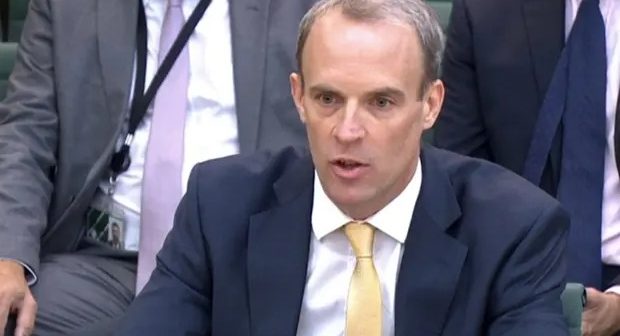Dominic Raab has said the central assessment of the UK government was that Kabul was “unlikely” to fall in 2021.
The UK foreign secretary also disclosed he had overseen high-level talks between the UK and Pakistan to discuss the Afghan crisis and would be heading to the region imminently.
He told MPs on the Commons foreign affairs select committee: “The central assessment that we were operating to, and it was certainly backed up by the JIC (joint intelligence committee) and the military, is that the most likely, the central proposition, was that given the troop withdrawal by the end of August, you’d see a steady deterioration from that point and it was unlikely Kabul would fall this year.”
He said contingency planning and testing of such an assessment took place, adding: “That was something widely shared by Nato allies.”
Asked why the central British intelligence assessment was so badly wrong, Raab first blamed “optimism bias” about how long the US might retain troops in the country. But he continued: “In fairness, collectively across allies the assessment that [the Taliban]would not be able to advance at that speed was not correct.”
Facing criticism over what has been described as a lackadaisical attitude to the crisis, Raab admitted he had no record of when ministers had last visited either Uzbekistan or Tajikistan, both Afghanistan’s neighbours. He said the UK had contingency plans for a full draw-down in the British embassy in Kabul in June and in May started to reduce the staffing of the British embassy from 155 to 70.
Raab was facing an examination by a cross-party group of MPs, with many predicting his performance would determine his chances of avoiding a humiliating demotion in a future cabinet reshuffle. It is rare for a select committee to meet during a parliamentary recess.
In recent weeks, Raab has been accused of failing to gain any influence over the Biden administration’s Afghanistan policy on troop withdrawals, misjudging the gravity of the crisis by remaining on holiday and delegating the issue to junior ministers, and finally mishandling the refugee crisis by not reaching agreements on the processing of the processing of refugees in key neighbouring states, such as Tajikistan and Pakistan.
The Foreign Office has also been accused of leaving thousands of emails unread from MPs and others highlighting individual Afghans to whom the UK owes a debt who have been left stranded under Taliban rule.
Raab has in effect admitted he did not ring either the Pakistan or Afghan foreign minister in the six months leading up to the crisis. His critics say Raab regarded Afghanistan as yesterday’s war and have attacked him for being on holiday as the Taliban advanced towards Kabul.
Raab insisted he would not set out precisely when he went on holiday, describing the question as a fishing expedition, although he repeated that with the benefit of hindsight he would not have gone away.
Chris Bryant, a Labour MP on the committee, challenged him by pointing out that he, the prime minister and the most senior civil servant in the Foreign Office were all on holiday “when British nationals were at risk, when thousands that stood by us were in peril of their lives and no proper crisis centre existed”.The Foreign Office insists it has been in the lead diplomatically at the UN, trying to build a global consensus on how to press the Taliban to give those who want to leave free passage out of the country. It has also dispatched 16 staff to neighbouring countries to help process claims, while Sir Simon Gass, the chair of the JIC, has been in talks with the Taliban in Doha about extracting any British nationals still stranded.
Source: The Guardian

